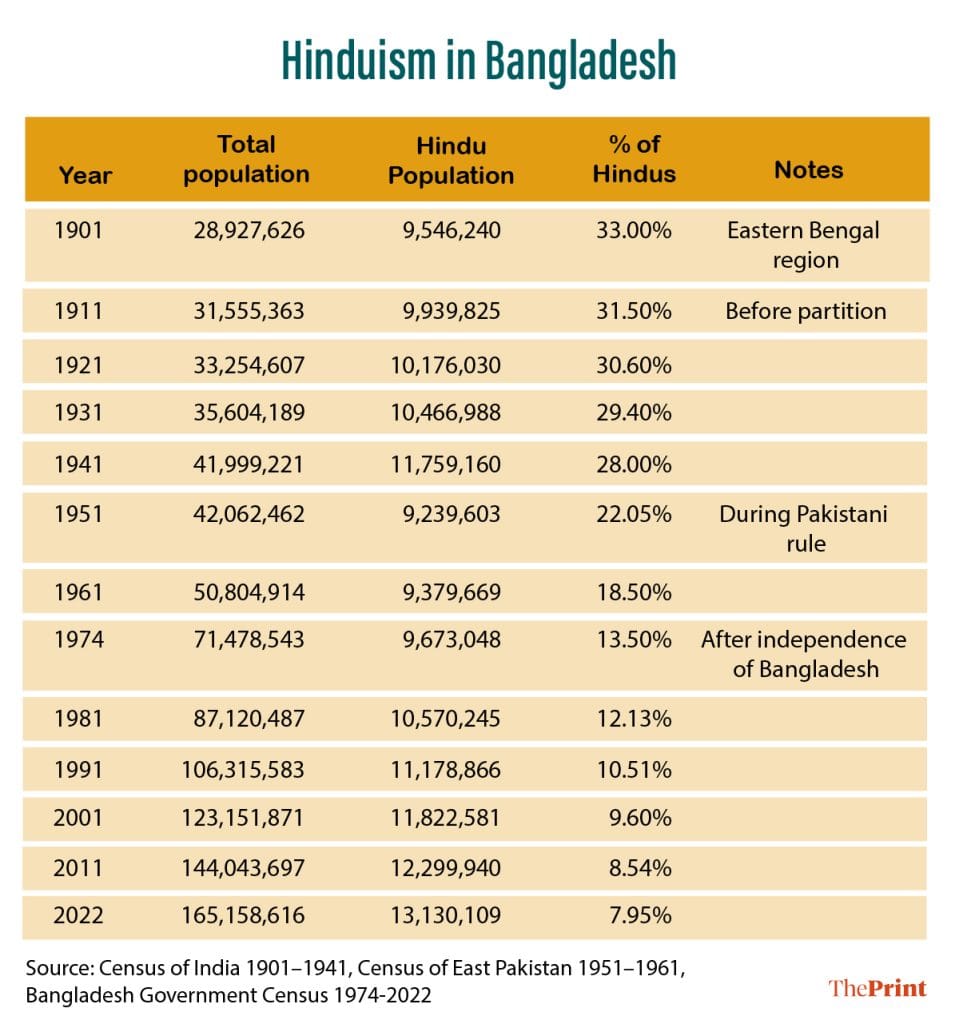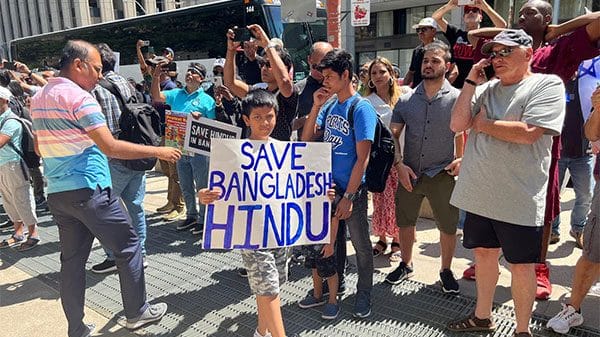A recent resolution of the European Union “expresses deep concern at the deteriorating human rights situation in Bangladesh; insists that the GoB restore a safe and enabling environment for NGOs, HRDs, activists and religious minorities and uphold the country’s international commitments, particularly under the International Covenant on Civil and Political Rights”. This is a step in the right direction—the rights of religious minorities and the ethnic cleansing of Hindus are finally being acted upon.
The sub-continent has a long and bloody history of genocide of Hindus, from the medieval era of foreign invasions. One of the earliest instances of mass violence against Hindus was in the 8th century with Muhammad bin Qasim’s conquest of Sindh. Subsequent invasions by Mahmud of Ghazni (11th century), Muhammad Ghori (12th century), and the Delhi Sultanate saw widespread destruction of temples, forced conversions, and massacres of Hindus. The Mughal Empire—under rulers like Babur, Aurangzeb—and the rule of Tipu Sultan, saw large-scale atrocities against Hindus. Kashi Vishwanath, Somnath, and Mathura, not to mention the birthplace of Lord Rama, were repeatedly destroyed and their wealth plundered.
Aurangzeb is said to have issued orders for the forced conversion of Hindus, the destruction of their temples, and heavy jizya (religious tax) to be imposed on non-Muslims. The current trend of violence against Hindus, if allowed to go on unabated, will cause history to come full circle. And to paraphrase George Santayana, those who forget history are condemned to repeat it.
Hindus are inherently respectful of diversity; whilst other religions preach ‘tolerance’, Hinduism teaches us to respect other religions. “Truth is one, the wise call it by many names”—this proverb from the Rig Veda encapsulates the idea that while different religions may have varied practices and interpretations, they all ultimately seek the same truth. It’s why we have been in the path of the invaders for centuries—we welcome those who come to invade us with respect.
What is genocide?
Under International law, the term “genocide” refers to certain acts committed with the intent to destroy, in whole or in part, a national, ethnic, racial, or religious group. Genocide is an international crime, according to the Convention on the Prevention and Punishment of the Crime of Genocide (1948).
In the last 100 years, millions have watched their ancestors’ hearts bleed, their grief was internalised for generations until it became generational trauma. Still, the systematic destruction of a community’s culture and beliefs, either through physical annihilation or cultural annexure continues. Cultural genocide is also defined under international law and is the systematic destruction of traditions, values, language, and other elements that make one group of people distinct from another. One needs to look no further than Partition for an example of this. Horrors stories are plenty. Both East and West Pakistan were witness to the mass expunging and conversions of Hindu communities in order to change the demographic profile.
While this subject is hotly debated and the political discourse surrounding the much-ignored topic is controversial, historical records and survivor testimonies point to multiple instances where Hindus have faced targeted massacres, forced conversions, temple destructions, and ethnic cleansing. And this continues even today. A recent UN report by a team invited by Bangladesh’s chief advisor Mohammad Yunus found that atrocities against Hindus in the state were not “mere exaggerated propaganda” as the government claimed.
Also read: At first, Bangladeshi media denied attack on Hindus. Now, India’s TV news stands vindicated
Barbaric Bangladesh
Hindus constitute less than 8 per cent of the total population of Bangladesh. It is pertinent to note that soon after Partition, in 1951, 22 per cent of Bangladeshis were Hindus. It has declined by more than half.
Where have the Hindus gone? If this does not fit the definition of genocide then what does? Hindus have been targeted by successive Islamic governments. Data that shows the declining percentage of Hindus is publicly available and has been appended below.

Over 2,000 attacks directed at Hindus have occurred after Sheikh Hasina was forced to flee in August 2024, Associated Press reported in November, quoting the Bangladesh Hindu Buddhist Christian Unity Council, a minority rights group.
Hasina in a recent virtual address to supporters in New York, claimed Yunus perpetrated acts of “genocide” on Hindus, Buddhists and Christians in Bangladesh after her ouster.
During the two months between 26 November 2024 and 25 January 2025 76 cases of attacks against Hindus have been reported in Bangladesh. Since August 2024, 23 Hindus have died and 152 incidents of attack on Hindu temples in Bangladesh, as per a report tabled in Parliament. Much needs to be done to highlight this catastrophic issue to prevent future harm.
Hindus and Sikhs in Pakistan
Pakistan’s track record of treatment of minorities like the Hindus and Sikhs is no different. The percentage of Hindus has reduced considerably since Partition. As per the 2023 census, Hindus made up 2.17 per cent of Pakistan’s population, a sharp drop from 14.6 per cent in 1941.
Most Hindus in Pakistan live in the Sindh province, some also live in Punjab. Pakistan’s biggest export, as we all know, is terror, and Hindus and Sikhs are regularly terrorised even in the birthplace of Sikhism, Talwandi which is now called Nankana Sahib.
Data from the MEA revealed that 241 cases of atrocities against Pakistani Hindus were reported in 2022, 103 in 2023 and 112 in 2024 (till October). In November 2024, 15 and 17-year-old Pakistani Hindu girls were found hanging from a tree in Islamkot.
While Western historical accounts rarely if ever, acknowledge genocide on Hindus, the Rawalpindi Massacres have found a chapter in Wikipedia. “The violence preceded the partition of India and was instigated and perpetrated by the Muslim League National Guards—the militant wing of the Muslim League—as well as local cadres and politicians of the League, demobilised Muslim soldiers, local officials and policemen,” the page reads. It has been referred to as “ethnic cleansing”.
Insight UK, a British Human Rights Organisation has also published a factsheet on the atrocities committed against Hindus in Pakistan since 2022.
Also read: Attacks on Hindus in Bangladesh show deep hatred. India must provide refuge
Genocide of Kashmiri Pandits
The ethnic cleansing of the Kashmiri Pandits is the “most successful, though little-known, campaigns of ethnic cleansing in the world,” according to the South Asia Terrorism Portal. The portal’s factsheet on the matter goes on to say that “pogroms of a far lesser magnitude in other parts of the world have attracted international attention, censure and action in support of the victim communities, but this is an insidious campaign that has passed virtually unnoticed, and on which the world remains silent”.
The UNHRC has completely ignored how propaganda, threats, and violence drove away thousands of Kashmiri Pandits. Their homes were taken over or destroyed, and prominent Pandits were assassinated—19 January 1990 marked the start of mass killings and forced displacement. It’s commemorated by Kashmiri Pandits as Holocaust Day. By March 1990, around 1 lakh Pandits had already fled.
Unlike other ethnic cleansings, their plight remained largely ignored until it was finally highlighted in the movie Kashmir Files.
The Hindu genocide is a historical reality that needs global recognition. Now that the EU has taken baby steps in condemning the persecution of minorities in Bangladesh, it is about time that the atrocities on Hindus are highlighted and brought to the international stage.
While much focus is placed on other genocides worldwide, Hindu suffering has often been overlooked. Acknowledging this history is crucial for justice, awareness, and prevention of further atrocities against Hindus.
Meenakshi Lekhi is a BJP leader, lawyer and social activist. Her X handle is @M_Lekhi. Views are personal.
(Edited by Theres Sudeep)







Hindus are far more privileged than Muslim in Bangladesh. If you look at their proportion and the rate in entering govt job you will know. Thing that you guys are referring as genocide, do you even know how that implies? Don’t create panic among people.
This is a baby step. The EU statement does not even mention Hindus, subsuming the victims under the broad (and invisibilising) ‘minorities’.
Either way, it’s about time the injustice from all sides that the Hindu community has suffered – heathen to one, kaffir to the other – is recognised.